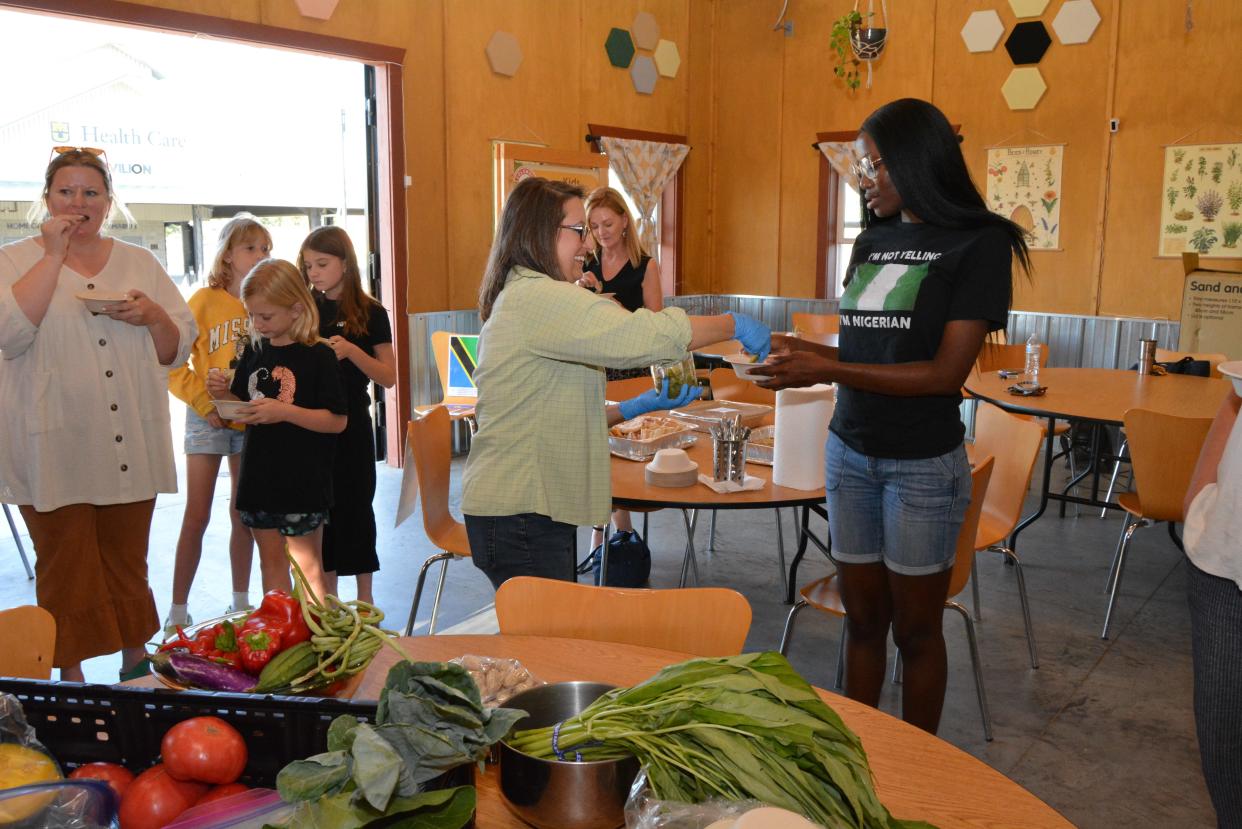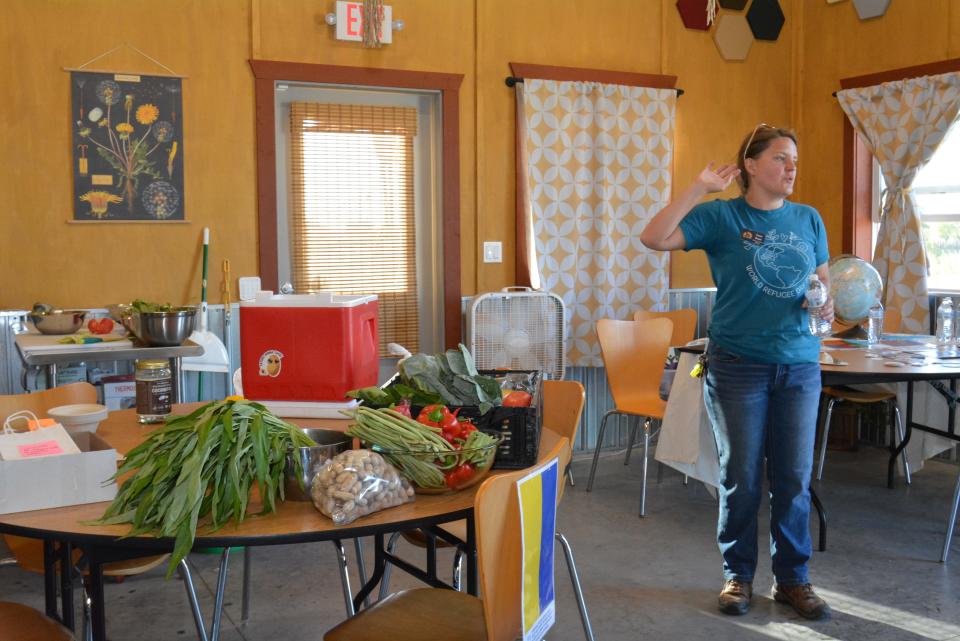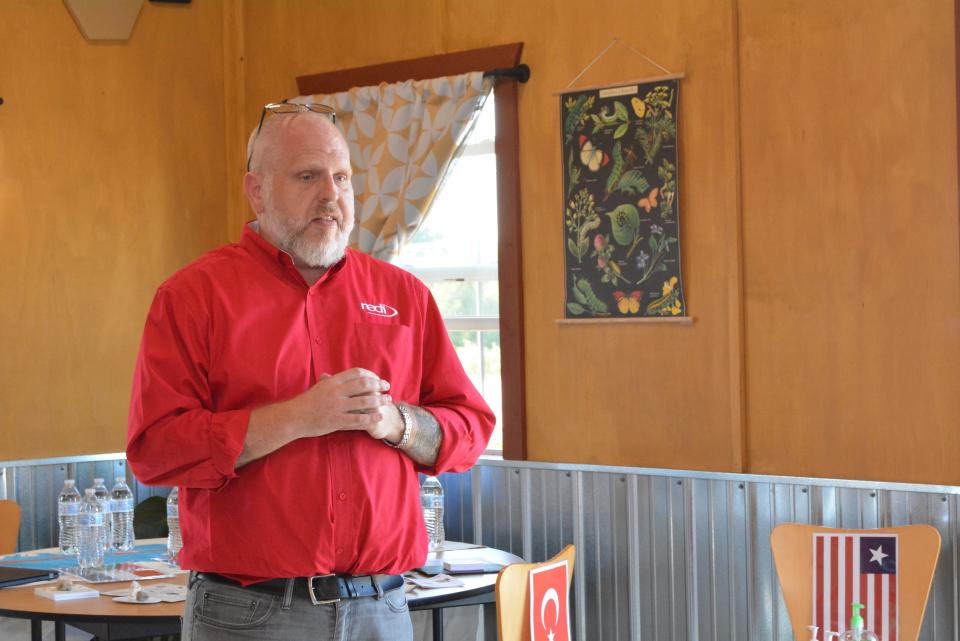These Columbia programs help refugees with entrepreneurship and a 'sense of belonging'

Refugees who come to Columbia often find themselves missing a taste of home.
Challenges include where to purchase the necessary produce or how to grow their own. If the person is passionate enough about sharing their ideas and culture with the wider community, they may want to pursue entrepreneurship.
Those subjects were addressed Monday from the classroom space of Columbia Center for Urban Agriculture at the MU Health Care Pavilion in Clary-Shy Park.
The Equitable Resources: Food and Food Growing event was sponsored by Catholic Charities Refugee Services, which is recognizing Welcoming Week and its theme of "Where We Belong."
The weeklong series of events kicked off Friday and ends Sunday.
Events remaining this week are a community panel on welcoming and equipping refugees at 5 p.m. Wednesday at the Broadway Christian Church garden amphitheater; an online cooking demonstration 4 p.m. Thursday via Zoom for Mexican Independence Day from the owners of La Terraza Mexican Restaurant; and a community potluck 1 p.m. Sunday at The Crossing Church in student center room 315.
"We have worked really hard to make sure all (refugees) feel a sense of belonging," said Valerie Berta, Catholic Charities community engagement coordinator. "This was inspired by Welcoming America ... centered around including everybody — refugees, immigrants, no matter where they come from.
"The clients we resettle help make this community and all others around mid-Missouri more prosperous."
Food is a gateway into another culture, she said.
Guests on Monday had a chance to taste produce grown the world over and used in dishes from various African and Southeast Asian cultures, such as long beans, other leafy greens, bitter melon, kohlrabi and much more.
Bolupe Ogunyooye, who is working as a Volunteer in Service to America, or Vista, at Heart of Missouri United Way, was among guests Monday to not only learn about other cultures but share a little bit of her own.
Her family moved to the United States, settling in the Dallas/Forth Worth area 25 years ago from Nigeria.
She started as a Vista, an Americorps program, on Aug. 15 in Columbia and had been searching for a taste of home. She was excited to learn CCUA had true cayenne peppers, which are hard to locate in grocery stores and other international markets.
She also was able to share with the small gathering ways in which her family would cook winter squash (types of pumpkin), along with its leaves.

Programs available to area refugees
For those wanting to start their own business, Regional Economic Development Inc. has incubator programs through The Hub, which currently has 90 clients, said Jay Sparks, REDI entrepreneurship coordinator.
"They are in varying stages (of development). ... Once people are dialed into (resources), they help continue to grow their business, and we like to be part of that first step as often as possible," he said.
There also are programs focused on minorities, and starting in October, REDI aims to hire a part-time coordinator whose entire responsibility is to work with refugees.
Learning opportunities are available as well through REDI's 1 Million Cups Program. It's a weekly coffee morning with guest speakers, who may run small business startups themselves.
"That is definitely the 'jump in with both feet' way to entrepreneurship here in Columbia. There is a safe and caring community that wants to help entrepreneurs grow. The networking there is top notch," Sparks said.
These programs work as a sort of surrogate "it's not what you know, it's who you know" mentality, he added, noting they help build connections people may not have.
The major aspect of entrepreneurship is knowing you belong at the table, no matter who is sitting across from you, Sparks said.

"As we get into refugee services and helping new communities, that is so important to convey to everyone," Sparks said about inclusive conversations. "The ideas might seem strange to me, a business owner, a banker in Columbia, but it may be the standard somewhere else in the world.
"We need to be exposed to that and we need to be able to bring that into our business landscape."
One significant program related to food access and production is CCUA's Opportunity Gardens, said Saxon Brown with CCUA.
The program is for low-income residents, which can include refugees, to get the resources they need to have an at-home garden, even if via multiple containers, rather than in a yard. CCUA also provides its produce to the Food Bank for Central & Northeast Missouri.
"For three years, we help them with garden installation or soil improvement, collect plants and seeds — the basic things you would need for a garden," Brown said, adding it was through the refugee participants she learned more about global crops that also can grow in Missouri, generally over the summer.
The importance of food culture hit home for Brown when working with refugee participants, she said.
Charles Dunlap covers local government, community stories and other general subjects for the Tribune. You can reach him at cdunlap@columbiatribune.com or @CD_CDT on Twitter. Please consider subscribing to support vital local journalism.
This article originally appeared on Columbia Daily Tribune: REDI, CCUA provide insight on programs aiding Columbia-area refugees

